Updated February 24, 2025
Don’t let bacteria, viruses, fungi, or bed bugs in hotel accommodation spoil your trip. Before booking, unpacking, and settling in, get into the habit of adopting a routine that incorporates ways to avoid germs during your hotel stay.
Table of Contents
- Ways to avoid germs during your hotel stay
- 1. Know the major germ spots in hotel rooms
- 2. Read the reviews
- 3. Read room descriptions
- 4. Contact the hotel
- 5. Reach for the luggage rack
- 6. Check the sheets to make sure they’re clean
- 7. Cast aside decorative bedding
- 8. Look for evidence of bed bugs
- 9. Wipe the ‘germiest’ surfaces with anti-bacterial wipes
- 10. Give the TV remote special attention
- 11. Have an unpacking plan
- 12. Slip into indoor footwear
- 13. How clean is the bathrobe?
- 14. Use a hanging kit for toiletries
- 15. Bring your refillable water bottle for drinking water
- 16. Kick the bucket
- 17. Be wary of in-room coffee makers
- 18. Wash hands with soap and warm water
- 19. Choose the cleanest places to sit
- 20. Don’t make the beds when you leave
- What to pack to avoid germs during your hotel stay
- Conclusion
Ways to avoid germs during your hotel stay
1. Know the major germ spots in hotel rooms
Consumer reports and undercover investigations have revealed the ugly truth about the cleanliness of hotel rooms.
If you regularly use a glass, pen, or TV remote without giving it another thought, think again. You may be stirring up a nest of germs and bacteria left behind by other guests. While the expectation is that a hotel room has been thoroughly cleaned, this isn’t necessarily the case.
The Canadian Broadcasting Corporation (CBC) Marketplace’s episode “The Dirt on Hotels” identified six major germ spots in hotel rooms:
-
- remote controls
- bedding
- bathroom faucets and counters
- coffee makers
- ice buckets
- telephones
Ice machines? For more information, take a look at KICK THE BUCKET: Why hotel ice machines and buckets could be making you sick.
Hotel coffee makers can harbour mould and bacteria according to How Dirty Is Your Hotel Room Coffeemaker?
Hotel glasses? Undercover Investigation: Dirty Hotel Drinking Glasses provides some observations and conclusions.
2. Read the reviews
Reviews offer insights on what to expect. Before choosing where to stay, read reviews. If they’re negative or mixed, look elsewhere. Don’t be that person who posts on Tripadvisor: “I wish I’d read the reviews…”
3. Read room descriptions
Look for descriptions and photographs of the beds, bedding, furniture, and in-room amenities. Read references to cleaning protocols, including measures adopted in light of the global pandemic.
“In guest rooms, we have elevated our rigorous protocols to thoroughly clean all surfaces with hospital-grade disinfectants. Additional disinfecting wipes are available for guest use.”
Does the bedding include a comforter, continental quilt, duvet, or doona? Whatever term you’re familiar with, does it have a cover that is laundered after each stay? The prevailing view is that a comforter without a cover isn’t cleaned after each stay unless it is visibly soiled or stained.
Is there a bedspread and is it laundered after each use? Probably not. Are there cushions on the bed and couch? Are decorative elements such as pillow shams, bed runners, and throws part of the bedding? Are they laundered after each guest? Likely not.
4. Contact the hotel
Cleanliness needs to be taken seriously and a facility interested in your business should welcome your questions. Asking them in advance will place the facility on alert that cleanliness is important to you. If you’re calling and the person isn’t equipped to respond to your questions, ask to speak to a manager.
Ask that any bedding, cushions, or decorative elements that aren’t laundered after each stay be removed from your room before arrival. If you have allergies or medical issues that point to the need for a clean environment, share them and any associated requests. Chances are greater that the room will be cleaned much more thoroughly if you do.
I like to think that these kinds of efforts improve standards and make things easier for other guests.
5. Reach for the luggage rack
What’s the first thing you do when entering your guest room? One early task is to find the folding luggage rack and situate it away from walls, furniture, and drapes. You’ll need a safe place to place your luggage while attending to other tasks. Just inside the door is a good choice.
6. Check the sheets to make sure they’re clean
This is especially important in rooms where there is more than one bed. In some cases, guests will remake a bed out of habit, courtesy, or some other reason. If a bed appears to be undisturbed, housekeeping staff may have instructions to leave it as is to conserve time and laundering costs.
7. Cast aside decorative bedding
Increasingly, hotels, hostels, and other holiday accommodation use duvets with removable covers designed to be laundered after each stay. Elsewhere, assume bedspreads, decorative pillows, shams, or fabric throws are not cleaned after every guest. Cast them aside, or if they’re needed for warmth, make sure there’s a comfortable overlap of the top sheet and the bed covering.
Another option is to travel with a sleeping bag liner. Many are made of silk. Silk helps to regulate body heat. It keeps you warm when you’re cold and cool if you’re hot. There are versions with a pocket to accommodate a pillow. Mine is a Pillow Silksak from the New Zealand company, Silk Living. For more information, see 8 Compelling reasons to pack a silk sleep sack.
8. Look for evidence of bed bugs
Bed bugs are a real concern and no hotel, vacation property, or tourist accommodation is immune. In advance, take a few moments to learn some bed bug basics. Public Health, Province of Nova Scotia, has a succinct Bed Bug Fact Sheet of practical information, including how to detect bed bugs if they’re present. As bed bugs live ninety percent of their lives in the dark and can be seen with the naked eye, pack a decent flashlight. Turn off the lights, close curtains, and Inspect seams, creases, cracks, and crevices where bed bugs are likely to hide. Look for tell-tale signs of reddish-brown casings and faeces.
After experiencing bed bugs on his travels, frequent traveller and blogger, foXnoMad created an excellent video of his inspection routine when entering a hotel room.
If you have the slightest concern, grab your luggage and head for the front desk. Ask for another room on another floor, far away from the room you were assigned. Or, if possible, move to another property.
If bed bugs hitch a ride in your luggage, removing them take takes weeks or months of treatment to remove them. Besides, bed bug bites are itchy, can become infected, or cause an allergic reaction.
9. Wipe the ‘germiest’ surfaces with anti-bacterial wipes
Assume the property’s cleaning and training protocols are deficient. Imagine that the worker who cleaned the room was overworked, underpaid, and cut corners to keep up. S/he likely had a quota and schedule with time constraints.
It might also help to visualize the previous guest as having a raging dose of the ‘flu. Or worse, they contracted COVID-19, SARS, Ebola, Zika, or the next yet-to-be identified novel virus.
Erase the bacterial history of the previous guests by wiping surfaces you’re likely to touch. A couple of wipes should do the trick — at least one in the bathroom and one in the bedroom. Wipe the bedside tabletop, lamp switch, door handles, temperature control, and light switches. Skip the telephone, clock radio, room service menu, or hairdryer if you won’t be using them. Otherwise, include them. Limiting your efforts reduces the chance of cross contamination. In the bathroom, wipe the bathroom countertop, taps, toilet flush handle or button, and end with the toilet seat.
Consider making your own all-natural solution and disinfecting with reusable or compostable wipes. Individually wrapped Flygiene Alcohol Sanitizing Wipes are easy to pack.
10. Give the TV remote special attention
The TV remote is notorious for being the ‘germiest’ item in your room. Place it in a see-through bag — it will still work, and you won’t need to worry about all those germs flourishing in the cracks and crevices.
11. Have an unpacking plan
Many travellers regard their bags as a healthier environment for their belongings than drawers used by other guests. Consider limiting unpacking to toiletries, and clothes you can fit on hangers.
For extra protection from bed bugs, consider packing a white garbage bag large enough to slip over your luggage. A closed garbage bag provides a safe haven for luggage and makes it easier to detect bed bugs looking for a place to hide or hitch a ride.
12. Slip into indoor footwear
Pack what’s needed to avoid walking barefooted on carpets and bathroom floors. A waterproof option can double as shower shoes when using shared showers or wearing poolside or at the beach. Flip-flops (I like Havaianas Slim) or sandals (e.g., Crocs wedge sandals) serve such a purpose. Unlike socks, they offer a measure of protection from sharp objects.
Skip the hotel slippers unless you’re satisfied they haven’t been worn by a previous guest. Besides, they’re disposable single-use products destined for the garbage unless you take them with you.
13. How clean is the bathrobe?
How can you be sure the bathrobe escaped being laundered because a previous guest returned it to a hanger after use? If in doubt, ask for a replacement.
14. Use a hanging kit for toiletries
Hang your toiletries on a back-of-door hook, towel rack, or shower rod. With a hanging kit, you don’t need to unpack toiletries and place items on a bathroom countertop of questionable cleanliness.
15. Bring your refillable water bottle for drinking water
It’s possible that glassware has been rinsed under the bathroom tap and wiped with a dirty rag or discarded bath towel. The paper cap sitting on top of a glass tumbler is no guarantee that it’s clean. If you need to use one, clean it thoroughly with soap and hot water.
The housekeeping cart in the hallway may provide clues regarding coffee cups and glassware. If there isn’t a selection of dirty items destined for a dishwashing machine, and clean replacements, it’s a fair assumption that cleaning takes place in the hotel room. If in doubt, ask.
16. Kick the bucket
Avoid ice buckets; assume they’re rarely cleaned or sanitized. Chances are there’s an ice bucket bag for ice. If not, carry a dry sack to collect ice to cool canned or bottled drinks. Assume the hotel ice machine isn’t cleaned on a regular basis so you might consider not adding ice cubes to drinks.
17. Be wary of in-room coffee makers
I’ve been in hotel rooms where coffee makers contained the coffee dregs from the last guest, and I’ve read enough studies on hotel coffee makers that I can’t bear to use them.
A coffee maker should be cleaned with vinegar or a descaling solution every few months. Is this done? It doesn’t hurt to inquire about a hotel’s cleaning protocols if you need that in-room coffee to start the day.
My approach is to suss out the locations and hours of operation of the nearest coffee shops. One of my travelling companions always packs an Aeropress. Another, a tea drinker, packs her favourite tea bags and a dual-voltage immersion heater.
18. Wash hands with soap and warm water
Wash hands as soon as you enter the room, then as often as possible. According to the CDC (Centers for Disease Control and Prevention), it takes 20 seconds of vigorous hand washing with soap and water to effectively kill germs.
Complement hand washing with hand sanitizer. Keep a travel-sized bottle of hand sanitizer within easy reach at all times. For a natural product, EO Essential Oils makes a sugarcane-derived alcohol-based sanitizer in lavender, peppermint or sweet orange. Dr. Bronner’s makes an organic hand sanitizer in lavender or peppermint. Or, try a homemade version using one of the many recipes on the Internet. A friend makes hers using two parts of 99% ethyl or isopropyl alcohol, one part pure aloe vera gel, and a few drops of lavender essential oil.
19. Choose the cleanest places to sit
Has the previous guest placed their luggage or rested their shoes on the bed, couch, or chair? What were (or weren’t) they wearing at the time? Peel back the bedding and sit on clean sheets. Or, sit on a towel. Another option is to ask for an extra sheet from housekeeping and drape it where you plan to sit.
20. Don’t make the beds when you leave
If the beds have been used, don’t remake them in case it’s assumed the bedding doesn’t need to be stripped and laundered.
What to pack to avoid germs during your hotel stay
- flashlight
- reusable see-through bag for the TV remote
- cleaning wipes
- hanging toiletries kit
- flip-flops / slippers
- refillable water bottle
- dry bag to collect ice
- hand sanitizer containing at least 60% alcohol
- silk sleeping bag liner
- packable coffee maker or dual-voltage immersion heater
Conclusion
If the cleanliness of your room falls short of your expectations, bring it to the attention of your accommodation provider as soon as possible. This gives staff the opportunity to address the problem.
Before checking out, tidying up will help you locate items that might otherwise be left behind. Besides, it will help housekeeping staff concentrate on cleaning the room and staying on schedule.
Admittedly, these practices lean a little on the germophobic side. However, they take very little time and should provide you with the peace of mind to relax and enjoy your stay.
If you found this post helpful, please share it by selecting one or more social media buttons. Would you care to weigh in? What do you do to promote a healthy hotel stay? How do you avoid dirty hotels? Please add your thoughts in the comments. Thank you.
Pin for later?
Photo Credits:
- Featured image by Fabrian Zakaria (Unsplash)
- Pin image by Radu Spătaru (Unsplash)
- bed bugs image by Hermann Luyken (CCO, Wikimedia Commons)
Some of the links on this page are affiliate links. If you use them to buy something, you don’t pay more, but this website earns a small commission, which helps pay the costs of maintaining the site. Thank you for your support.

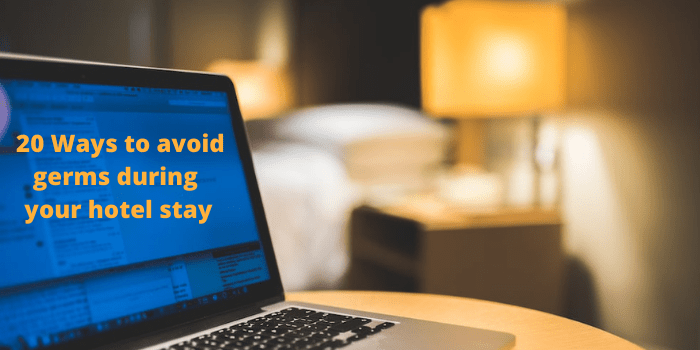
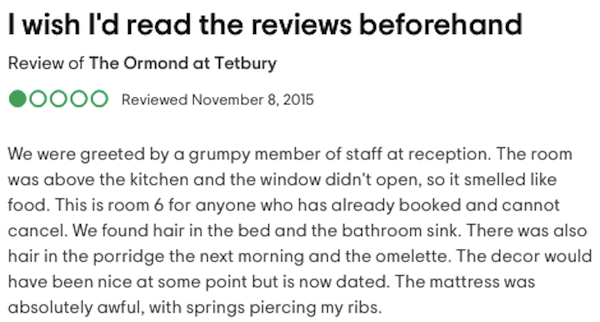
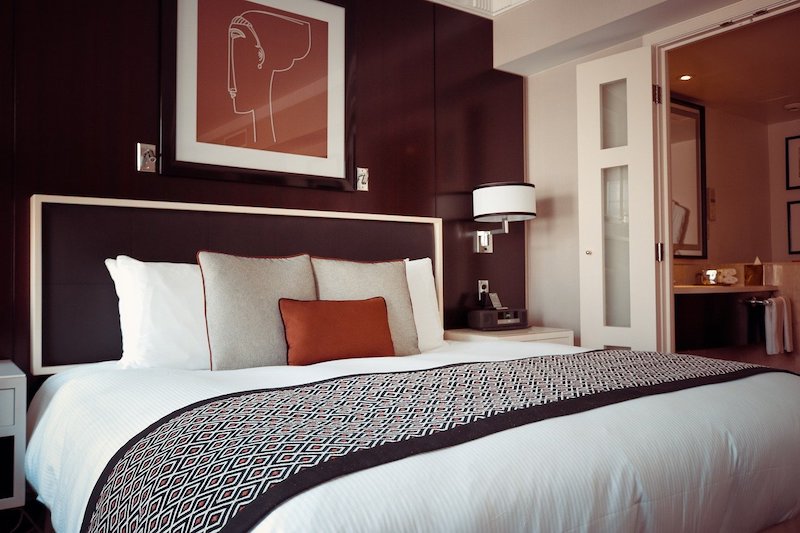
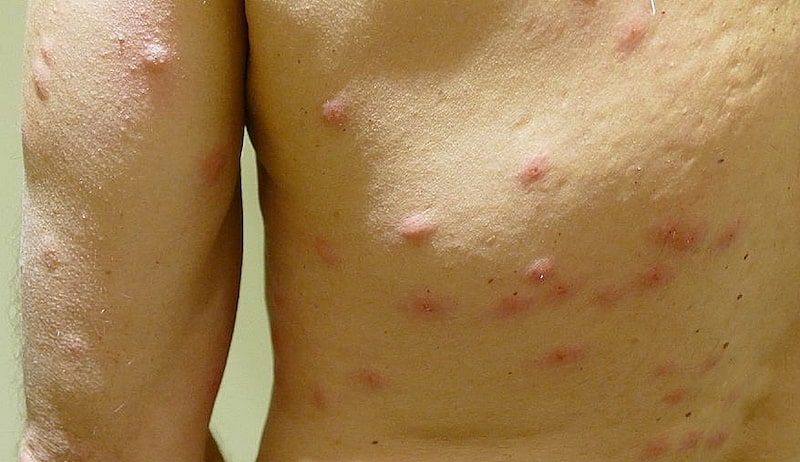
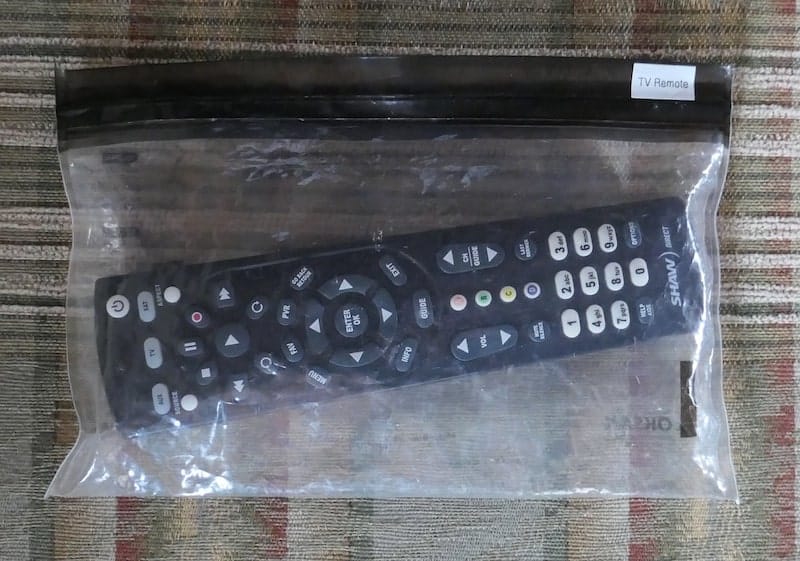

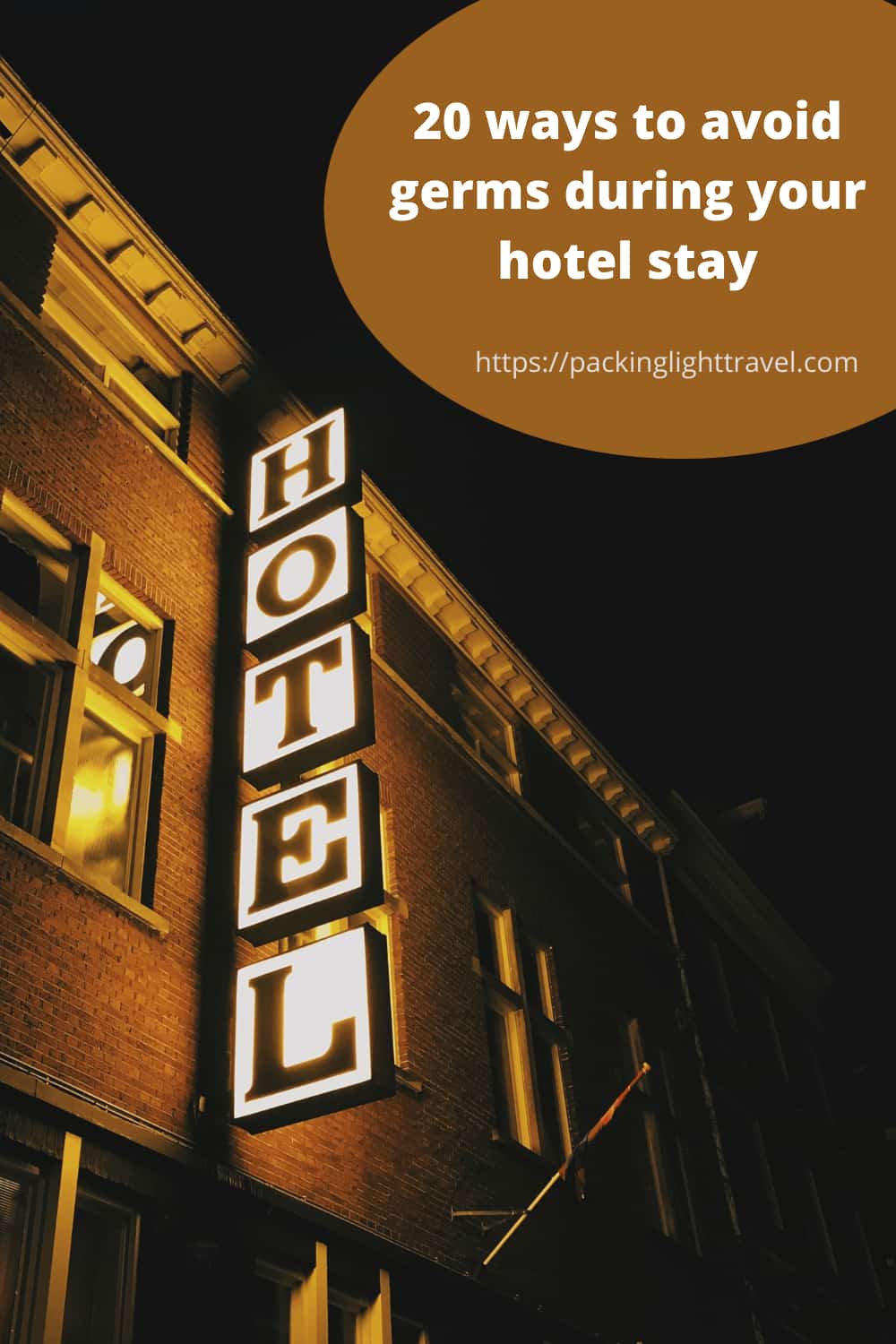




Excellent tips! Very relevant during these times of pandemic.
John Gatesby recently posted…COVID Leads to Oxidative Stress and Parasympathetic and Sympathetic (P&S) Dysfunction
Hi Anne
Your guide of 20 ways to avoid germs during a hotel stay sounds great. A few days ago when we went to the beach to hang out with friends, 2 of my friends had this problem while staying at the hotel. On the second day, one of the two friends suddenly started itching in the stomach and the whole body of the other and the skin of the body started salivating. After the doctor’s bath, I found out that the towel that was given to our hotel contained germs and was infected with it. Thanks for sharing with us 20 ways to stay sterile while staying at the hotel.
Mahir recently posted…choosing the right shoes for any type of use
Great advice! A little caution goes a long way. I always wipe down surfaces, check the bedding, and use hand sanitizer—better safe than sorry! Thanks for the helpful reminder! 👍🏼🏨